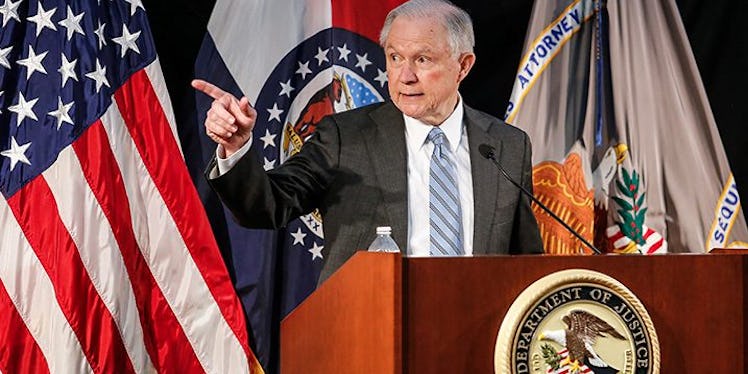This is a story about Jeff Sessions, the top law enforcement official in the country.
It's also a story about key words used during the Trump campaign, and how those key words foreshadowed what Sessions is doing now.
There's something you should know about those key words, though. They can sound completely harmless to some people, but terrifying to others.
As the election season continued and Trump and his allies used these words more and more, black people definitely had reason to hear terror.
The news that came this week shows just what that reason is.
On Monday, it was reported Attorney General Sessions ordered his staff to review the 20-plus agreements for reform that the Obama administration had signed with different police departments around the country.
These reform efforts were agreed upon in cities that saw the most fiery protests and high-profile shootings, like Baltimore, Ferguson, Cleveland and Chicago.
In practically every case, these agreements were the result of an investigation by the US Department of Justice. When the DOJ would release its findings, a familiar pattern would typically reveal itself: The police departments were no strangers to violating civil rights or disproportionately targeting black people.
Now that the DOJ is directed by Sessions, however, the department is threatening to alter the agreements. It is highly disappointing and concerning news, but also predictable.
Why? Because of key words like these:
1. "States' Rights"
When it comes to matters relating to criminal justice, Sessions has consistently talked about respecting states' rights.
In other words, he believes the federal government should not be meddling in local government affairs. On certain issues, states and cities should decide for themselves how to govern, Sessions says.
That's one view, certainly. But here's another one: In American history, the idea of "states' rights" has most notably been invoked by people in power who were avoiding policies that would fight segregation.
The argument against ending slavery? States' rights.
The argument against ending segregation? States' rights.
"States' rights," when referenced by politicians with regard to subjects that mostly concern black people, are seldom a good sign for black people.
So, when a Jeff Sessions deputy tried to delay the process for confirming Baltimore's agreement with the Obama administration, it's not a surprise what the deputy cited.
Deputy Assistant Attorney General John Gore said reform is "really the job of local officials."
States' rights.
2. "Law And Order"
The words "law and order" have history. Richard Nixon was the president of law of order when he got elected in 1968.
What followed was a drug war that resulted in a spike in arrests and demonization of users.
So, when Donald Trump went on the Republican National Convention stage last summer and did his best Nixon imitation, we knew what to watch for: an increase in arrests, more emphasis on the importance of police officers' authorities and less emphasis on their accountability.
Sure enough, Jeff Sessions has begun to shift that balance of emphasis. He said back in February,
One of the big things out there that's, I think, causing trouble and where you see the greatest increase in violence and murders in cities is somehow, some way, we undermine the respect for our police and made, oftentimes, their job more difficult.
All the while, he's shown no evidence that indicates a link between respect for police and the levels of violent crime in different cities.
3. "Tough On Crime"
Trump has long suggested it's time to get tougher on crime. While doing this, he's suggested increases in crime levels that have actually declined.
Take this speech at a Republican retreat, for example:
Trump said the murder rate in Philadelphia is increasing, but it has been steadily declining over the past decade https://t.co/C4UH4cYzw5 pic.twitter.com/unTdKwbdCQ — BuzzFeed News (@BuzzFeedNews) January 26, 2017
The fact that Trump's push to get tough on crime doesn't align with reality isn't exactly a surprise, though. Tough-on-crime politics have along been a cover for policies that just happen to result in jailing people of color for minor drug offenses.
So again, it's not surprising the man Trump chose to lead the Department of Justice was Sessions, a politician committed to the idea of drug wars and mandatory sentences, neither of which has solved anything.
Sessions' former colleague in the Senate, Republican senator Rand Paul, said it best.
In a 2013 op-ed for USA Today, Paul wrote,
I'm against drug use. I think anyone who encourages its use is wrong and is doing damage to society. But our current federal policies have done little to actually lessen drug use, while doing irreparable damage to even the most casual drug users — young men and women who've made mistakes, just as a young Bush and Obama allegedly did.
None of that seems to matter, though.
It doesn't matter our drug wars have failed. It doesn't matter being "tough on crime" doesn't work. It doesn't matter instilling "law and order" is a proven dog whistle calling for oppressive policing.
It doesn't even matter "states' rights" is a proven copout for the federal government to avoid fighting racism.
The reason it doesn't matter is because Jeff Sessions is starting to do things black people had plenty of reasons to fear when Trump got elected, regardless of what history says.
These actions aren't unexpected, though. The rhetoric both men have used has made them predictable.
